1 - 25 of 19
| Creator | Title | Description | Subject | Date | ||
|---|---|---|---|---|---|---|
| 1 |
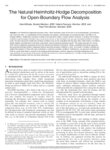 | Pascucci, Valerio | The natural Helmholtz-Hodge decomposition for open-boundary flow analysis | The Helmholtz-Hodge decomposition (HHD), which describes a flow as the sum of an incompressible, an irrotational, and a harmonic flow, is a fundamental tool for simulation and analysis. Unfortunately, for bounded domains, the HHD is not uniquely defined, traditionally, boundary conditions are impose... | 2014-01-01 | |
| 2 |
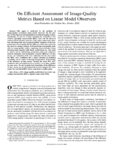 | Wunderlich, Adam James | On efficient assessment of image-quality metrics based on linear model observers | This paper is motivated by the problem of image-quality assessment using model observers for the purpose of development and optimization of medical imaging systems. Specifically, we present a study regarding the estimation of the receiver operating characteristic (ROC) curve for the observer and ass... | 2012-01-01 | |
| 3 |
 | Gerig, Guido | Parametric regression scheme for distributions: analysis of DTI fiber tract diffusion changes in early Brain Development | Temporal modeling frameworks often operate on scalar variables by summarizing data at initial stages as statistical summaries of the underlying distributions. For instance, DTI analysis often employs summary statistics, like mean, for regions of interest and properties along fiber tracts for populat... | 2014-01-01 | |
| 4 |
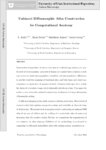 | Gerig, Guido | Unbiased diffeomorphic atlas construction for computational anatomy | Construction of population atlases is a key issue in medical image analysis, and particularly in brain mapping. Large sets of images are mapped into a common coordinate system to study intra-population variability and inter-population differences, to provide voxel-wise mapping of functional sites, a... | 2004-01-01 | |
| 5 |
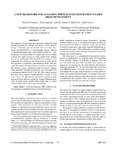 | Gerig, Guido | A new framework for analyzing white matter maturation in early brain development | The trajectory of early brain development is marked by rapid growth presented by volume but also by tissue property changes. Capturing regional characteristics of axonal structuring and myelination via neuroimaging requires analysis of longitudinal image data with multiple modalities. Complementary ... | 2010-01-01 | |
| 6 |
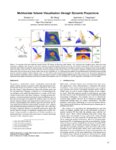 | Pascucci, Valerio | Multivariate volume visualization through dynamic projections | We propose a multivariate volume visualization framework that tightly couples dynamic projections with a high-dimensional transfer function design for interactive volume visualization. We assume that the complex, high-dimensional data in the attribute space can be well-represented through a collecti... | 2014-01-01 | |
| 7 |
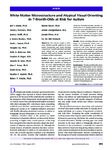 | Gerig, Guido | White matter microstructure and atypical visual orienting in 7 month-olds at risk for autism | Objective: The authors sought to determine whether specific patterns of oculo-motor functioning and visual orientingcharacterize 7-month-old infants who later meet criteria for an autism spectrum disorder (ASD) and to identify the neural correlates of these behaviors. Method:Data were collected from... | 2013-01-01 | |
| 8 |
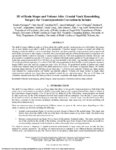 | Gerig, Guido | 3D of brain shape and volume after cranial vault remodeling surgery for craniosynostosis correction in infants | The skull of young children is made up of bony plates that enable growth. Craniosynostosis is a birth defect that causes one or more sutures on an infant's skull to close prematurely. Corrective surgery focuses on cranial and orbital rim shaping to return the skull to a more normal shape. Functional... | 2013-01-01 | |
| 9 |
 | Gerig, Guido | Computational anatomy to assess longitudinal trajectory of brain growth | This paper addresses the challenging problem of statistics on images by describing average and variability. We describe computational anatomy tools for building 3-D and spatio-temporal 4-D atlases of volumetric image data. The method is based on the previously published concept of unbiased atlas bui... | 2006-01-01 | |
| 10 |
 | Kuhlman, Brian | PHD Entrepreneur | The idea for this speech began when my friends and family started asking what I would do after graduating with my PhD in psychology. Folks tended to get a bit confused when I replied that my plan is to start a business. You don't need a PhD to do that! It's true. The path leading from PhD to Entrepr... | entrepreneur; PhD; doctoral; industry; academia | 2013-05-03 |
| 11 |
 | Awate, Suyash Prakash | Multiatlas segmentation as nonparametric regression | This paper proposes a novel theoretical framework to model and analyze the statistical characteristics of a wide range of segmentation methods that incorporate a database of label maps or atlases; such methods are termed as label fusion or multiatlas segmentation.We model these multiatlas segmentati... | 2014-01-01 | |
| 12 |
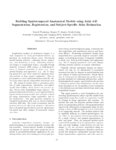 | Gerig, Guido | Building spatiotemporal anatomical models using joint 4-D segmentation, registration, and subject-specific atlas estimation | Longitudinal analysis of anatomical changes is a vital component in many personalized-medicine applications for predicting disease onset, determining growth/atrophy patterns, evaluating disease progression, and monitoring recovery. Estimating anatomical changes in longitudinal studies, especially th... | 2012-01-01 | |
| 13 |
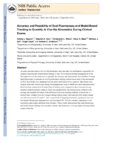 | Maas, Steve | Accuracy and feasibility of dual fluoroscopy and model-based tracking to quantify in vivo hip kinematics during clinical exams | Accurate measurements of in-vivo hip kinematics may elucidate the mechanisms responsible for impaired function and chondrolabral damage in hips with femoroacetabular impingement (FAI). The objectives of this study were to quantify the accuracy and demonstrate the feasibility of using dual fluoroscop... | 2014-01-01 | |
| 14 |
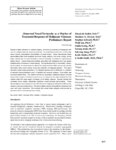 | Gerig, Guido | Abnormal vessel tortuosity as a marker of treatment response of malignant gliomas: preliminary report | Despite multiple advances in medical imaging, noninvasive monitoring of therapeutic efficacy for malignant gliomas remains problematic. An underutilized observation is that malignancy induces characteristic abnormalities of vessel shape. These characteristic shape abnormalities affect both capillari... | 2004-01-01 | |
| 15 |
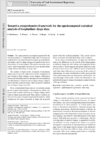 | Gerig, Guido | Toward a comprehensive framework for the spatiotemporal statistical analysis of longitudinal shape data | This paper proposes an original approach for the statistical analysis of longitudinal shape data. The proposed method allows the characterization of typical growth patterns and subject-specific shape changes in repeated time-series observations of several subjects. This can be seen as the extension ... | 2013-01-01 | |
| 16 |
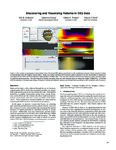 | Anderson, Erik Wesley | Discovering and visualizing patterns in EEG data | Brain activity data is often collected through the use of electroen-cephalography (EEG). In this data acquisition modality, the electric fields generated by neurons are measured at the scalp. Although this technology is capable of measuring activity from a group of neurons, recent efforts provide ev... | 2013-01-01 | |
| 17 |
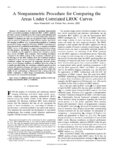 | Wunderlich, Adam James | A nonparametric procedure for comparing the areas under correlated LROC curves | In contrast to the receiver operating characteristic (ROC) assessment paradigm, localization ROC (LROC) analysis provides a means to jointly assess the accuracy of localization and detection in an observer study. In a typical multireader, multicase (MRMC) evaluation, the data sets are paired so that... | 2012-01-01 | |
| 18 |
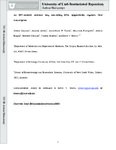 | Planelles, Vicente | An HIV-encoded antisense long non-coding RNA epigenetically regulates viral transcription | The abundance of long non-coding RNAs (lncRNAs) and their wide range of functional roles in human cells are fast becoming realized. Importantly, lncRNAs have been identified as epigenetic modulators and consequently play a pivotal role in the regulation of gene expression. A human immunodeficiency v... | 2014-01-01 | |
| 19 |
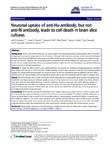 | Jaskowski, Troy D. | Neuronal uptake of anti-Hu antibody, but not anti-Ri antibody, leads to cell death in brain slice cultures | Background: Anti-Hu and anti-Ri antibodies are paraneoplastic immunoglobulin (Ig)G autoantibodies which recognize cytoplasmic and nuclear antigens present in all neurons. Although both antibodies produce similar immunohistological labeling, they recognize different neuronal proteins. Both antibodies... | 2014-01-01 |
1 - 25 of 19
